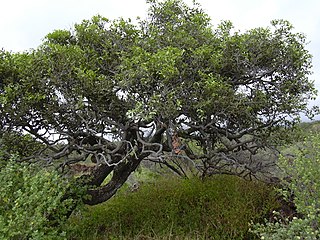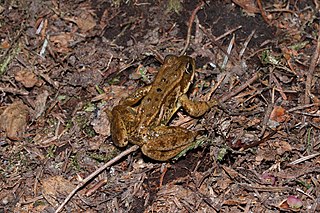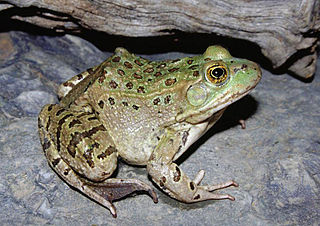
The Ebenaceae are a family of flowering plants belonging to order Ericales. The family includes ebony and persimmon among about 768 species of trees and shrubs. It is distributed across the tropical and warmer temperate regions of the world. It is most diverse in the rainforests of Malesia, India, Thailand, tropical Africa and tropical America.
Cypress is a common name for various coniferous trees or shrubs from the Cupressus genus of the Cupressaceae family, typically found in warm-temperate and subtropical regions of Asia, Europe, and North America.

Hirkan National Park is a national park in Azerbaijan, in the Talysh region. It was established in an area in Lankaran Rayon and Astara Rayon administrative districts on February 9, 2004 on the basis of the former "Hirkan State Reserve" which it superseded, on a surface area of 29,760 hectares (297.6 km2). It was enlarged by presidential decree on April 23, 2008 from 29,760 hectares (297.6 km2) to 40,358 hectares (403.58 km2).

The Caucasus-Anatolian-Hyrcanian temperate forests is a composite ecoregion of southern Europe and West Asia, designated by the World Wildlife Fund as one of their Global 200 ecoregions, a list of priority ecoregions for conservation.

The Persian brook salamander or Persian mountain salamander is an endemic amphibian species of salamander in the family Hynobiidae found in Iran and possibly Azerbaijan.

The Central Asiatic frog, or Asian frog, is a species of true frog, found in China, Kazakhstan, and Kyrgyzstan. Its natural habitats are temperate forests, temperate shrubland, temperate grassland, rivers, intermittent rivers, swamps, freshwater lakes, intermittent freshwater lakes, freshwater marshes, intermittent freshwater marshes, freshwater springs, inland deltas, arable land, pastureland, rural gardens, urban areas, water storage areas, ponds, aquaculture ponds, and irrigated land. It is not considered threatened by the IUCN.

The Cascades frog is a species of frog in the family Ranidae found in the Pacific Northwest, mainly in the Cascade Range and Olympic Mountains.
The Chaochiao frog is a species of frog in the family Ranidae, found in China and possibly in Myanmar and Vietnam. Its natural habitats are temperate forests, subtropical or tropical moist montane forests, subtropical or tropical high-altitude shrubland, subtropical or tropical high-altitude grassland, rivers, swamps, freshwater lakes, freshwater marshes, intermittent freshwater marshes, ponds, irrigated land, and canals and ditches. It is not considered threatened by the IUCN.

The Asiatic grass frog or Chinese brown frog is a species of frog in the family Ranidae, found in China and Mongolia.
The chevron-spotted brown frog is a species of frog in the family Ranidae, endemic to Mount Emei, Sichuan, China. Its natural habitats are temperate forests, freshwater marshes, and intermittent freshwater marshes. It is threatened by habitat loss.

The Chiricahua leopard frog is a species of frog in the family Ranidae, the true frogs.

The Greek stream frog, or simply Greek frog, is a species of frog in the family Ranidae found in Albania, Bosnia and Herzegovina, Bulgaria, Greece, North Macedonia, Serbia and Montenegro, and Turkey. Its natural habitats are temperate forests, temperate grassland, rivers, intermittent rivers, freshwater springs, and pastureland. It is not considered threatened by the IUCN.

The Japanese brown frog is a species of frog in the family Ranidae, endemic to Japan. Its natural habitats are temperate grassland, rivers, swamps, irrigated land, and seasonally flooded agricultural land.

The long-legged wood frog, also known as Caucasus frog, Brusa frog, or Uludağ frog, is a species of frog in the family Ranidae found in Armenia, Azerbaijan, Georgia, Iran, Russia, Turkey, and Turkmenistan.

The Hokkaidō frog or the Ezo brown frog is a species in the family Ranidae found in Hokkaidō, Japan, and Sakhalin, Russia. Its natural habitats are boreal forests, temperate forests, temperate shrubland, temperate grassland, rivers, swamps, intermittent freshwater lakes, freshwater marshes, intermittent freshwater marshes, arable land, ponds, and irrigated land.
The smooth-backed frog is a species of frog in the family Ranidae endemic to Mexico.

The stream brown frog or Napparagawa frog is a species of frog in the family Ranidae. It is endemic to Japan.

The lowland leopard frog is a species of frog in the family Ranidae that is found in Mexico and the United States.
Rana zhengi is a species of frog in the family Ranidae that is endemic to Sichuan, China.

The Hyrcanian forests are a zone of lush lowland and montane forests covering about 55,000 square kilometres (21,000 sq mi) near the shores of the Caspian Sea in Iran and Azerbaijan. The forest is named after the ancient region of Hyrcania. The World Wide Fund for Nature refers to the ecoregion as the Caspian Hyrcanian mixed forests. Since 5 July 2019, the Hyrcanian Forests have been designated a UNESCO World Heritage Site. In September 2023, the heritage site expanded to incorporate portions of the forest located in Azerbaijan.
















